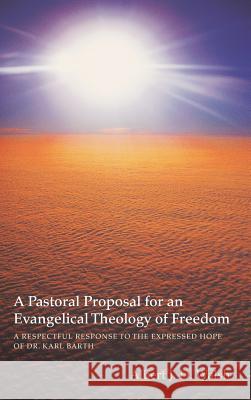A Pastoral Proposal for an Evangelical Theology of Freedom » książka
A Pastoral Proposal for an Evangelical Theology of Freedom
ISBN-13: 9781498265768 / Angielski / Twarda / 2013 / 144 str.
A Pastoral Proposal for an Evangelical Theology of Freedom
ISBN-13: 9781498265768 / Angielski / Twarda / 2013 / 144 str.
(netto: 148,42 VAT: 5%)
Najniższa cena z 30 dni: 155,41
ok. 16-18 dni roboczych
Dostawa w 2026 r.
Darmowa dostawa!
Description: In concluding the series of lectures given while he made his first and only visit to the U.S., Dr. Karl Barth expressed his hope to see a theology of freedom for humanity originating from the U.S. As a respectful response to the expressed hope of Karl Barth, Albert Walsh presents this essay as a pastoral proposal on the subject of freedom from the point of view of the Judeo-Christian tradition. Walsh presents both biblical and theological foundations for a theology of freedom, which he calls ""graced-freedom,"" contending that this is that transcendent freedom that God alone confers and sustains as a freedom for humanity. Endorsements: ""Freedom is a cherished value, yet it is often misunderstood within Christian circles. In this essay, Walsh provides a thoughtful and accessible study for layman and pastor alike. Through surveying biblical texts, he qualifies freedom, defining it as graced freedom in relation to the lordship of Christ. He then provides challenging pastoral applications in the context of ecumenicity. This is a thought-provoking essay on freedom."" --H. Drake Williams, III, Academic Dean and Professor of New Testament, Tyndale Theological Seminary ""Walsh's reflections, motivated by suggestions by Karl Barth, serve as an antidote to the church's tendency to mimic the environing society's identification of freedom with the expansion of opportunities for self-assertion. Against this view Walsh reminds us that genuine Christian freedom is the ontological gift of participation in Christ's act of reconciliation, and the enactment of service that issues from this gift."" --Lee Barrett, Professor of Systematic Theology, Lancaster Theological Seminary About the Contributor(s): Albert J. D. Walsh is Pastor of Heidelberg United Church of Christ, Hatfield, Pennsylvania, where he has served since 1999. His previous works include United and Uniting and The Eucharist's Biographer.
Description:In concluding the series of lectures given while he made his first and only visit to the U.S., Dr. Karl Barth expressed his hope to see a theology of freedom for humanity originating from the U.S. As a respectful response to the expressed hope of Karl Barth, Albert Walsh presents this essay as a pastoral proposal on the subject of freedom from the point of view of the Judeo-Christian tradition. Walsh presents both biblical and theological foundations for a theology of freedom, which he calls ""graced-freedom,"" contending that this is that transcendent freedom that God alone confers and sustains as a freedom for humanity.Endorsements:""Freedom is a cherished value, yet it is often misunderstood within Christian circles. In this essay, Walsh provides a thoughtful and accessible study for layman and pastor alike. Through surveying biblical texts, he qualifies freedom, defining it as graced freedom in relation to the lordship of Christ. He then provides challenging pastoral applications in the context of ecumenicity. This is a thought-provoking essay on freedom.""--H. Drake Williams, III, Academic Dean and Professor of New Testament, Tyndale Theological Seminary""Walshs reflections, motivated by suggestions by Karl Barth, serve as an antidote to the churchs tendency to mimic the environing societys identification of freedom with the expansion of opportunities for self-assertion. Against this view Walsh reminds us that genuine Christian freedom is the ontological gift of participation in Christs act of reconciliation, and the enactment of service that issues from this gift.""--Lee Barrett, Professor of Systematic Theology, Lancaster Theological SeminaryAbout the Contributor(s):Albert J. D. Walsh is Pastor of Heidelberg United Church of Christ, Hatfield, Pennsylvania, where he has served since 1999. His previous works include United and Uniting and The Eucharists Biographer.











